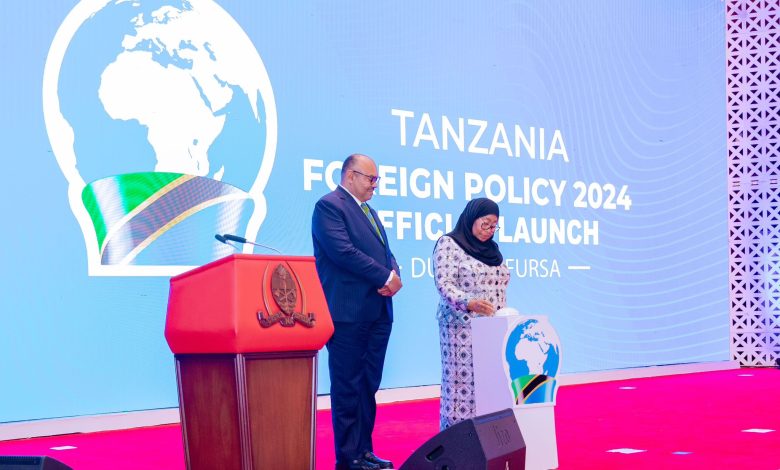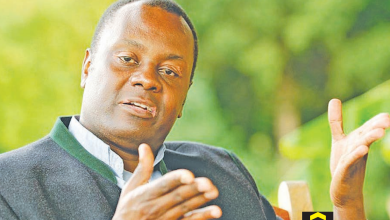Revised foreign policy signals TZ’s global shift

DAR ES SALAAM: IN a decisive address that marked a turning point in Tanzania’s global engagement, President Samia Suluhu Hassan introduced a bold reimagining of the country’s foreign policy grounded in sovereignty, economic ambition and strategic diplomacy.
This was not merely the rollout of a revised framework, it was a national statement of intent. With firm resolve, the President made clear that Tanzania is ready to move from the sidelines to the centre of international affairs engaging with the world on its terms, guided by purpose and protected by principle.
With a firm and forward-looking tone, President Samia stood before a hall packed with dignitaries, diplomats, civil servants, military leaders, business figures and international observers to declare the launch of a revised foreign policy that signals not just a bureaucratic shift but a recalibration of Tanzania’s place in the world.
Framed under the bold and evocative theme “The World is an Opportunity,” the Revised Foreign Policy (2001–2024 Edition) is more than a document, it is a statement of purpose.
It marks Tanzania’s transition from reactive diplomacy to strategic global engagement, a blueprint that reasserts national dignity while actively seeking economic prosperity and international influence.
“For far too long, we have navigated using tools shaped for a different time. Today’s global terrain demands a foreign policy that is proactive, protective and purpose-driven,” Dr Samia said.
Her speech reflected a country that, after more than two decades under the 2001 policy, now sees itself at a critical crossroads. In that span, the global order has changed dramatically with disruptive technologies, intensified geopolitical rivalries, climate crises and shifting economic paradigms. Tanzania must now not only adapt but assert itself.
“We cannot be a place where anyone feels entitled to say whatever they want about Tanzania,” the President warned. “There is a growing trend of activists from regional blocs attempting to meddle in our affairs. If they are restricted in their own countries, they should not be allowed to cause disorder here.”
It was a stern warning against external meddling, reflecting rising concern over digital disinformation, cyber threats and ideological infiltration. President Samia’s message was clear: Tanzania’s sovereignty is non-negotiable and its narrative will be authored from within.
At the core of the policy lie eight strategic pillars, each engineered to align Tanzania with the demands and opportunities of the 21st century while reinforcing its foundational values. The first and most prominent is economic diplomacy.
This pillar centres on drawing in foreign direct investment, expanding Tanzanian exports and creating publicprivate partnerships that can accelerate growth and modernise infrastructure.
“We must speak the language of investors while ensuring our national interests are protected,” President Samia said.
Next is the strategic utilisation of Tanzania’s geographic advantage. With its coastline, ports and transport corridors, Tanzania is primed to serve as a logistical hub for regional trade particularly under the transformative African Continental Free Trade Area (AfCFTA) initiative.
Another vital pillar is the elevation of Tanzania’s cultural and linguistic capital. Kiswahili, a language rooted in unity and history, is being positioned as a global tool of soft power a means to extend Tanzania’s influence in diplomacy, media and education.
ALSO READ: Tanzania ascends: President Samia’s transformative diplomacy in a multipolar world
Also emphasised is the critical role of the Tanzanian diaspora, both established and emerging. The government is calling on all Tanzanians abroad, including second generation descendants to contribute through investment, knowledge transfer and global advocacy.
“Instead of speaking negatively about your homeland, you must promote Tanzania’s positive image,” the President urged.
Forward-looking economic sectors also received significant attention. The revised policy lays out a roadmap for engaging in the blue and green economies, advancing digital transformation and tapping into the potential of strategic mineral resources such as rare earth elements.
These are not abstract ambitions. The government is actively seeking international partnerships to help realise these goals while reinforcing sovereignty over its natural assets.
A critical sixth pillar is enhanced global cooperation in response to shared global challenges including climate change, public health emergencies, terrorism and evolving digital technologies. Tanzania aims to be not just a participant but a contributor to international problemsolving.
The seventh pillar introduces a commitment to digital public diplomacy. By upgrading embassy communications and leveraging digital platforms, Tanzania intends to amplify its voice on the world stage while increasing transparency and engagement with its citizens.
Most uniquely, the eighth pillar is dedicated to the promotion of Tanzanian identity a new addition under President Samia’s leadership.
It encompasses the preservation of national values, protection of cultural heritage and promotion of patriotism as diplomatic capital. President Samia was unequivocal, the success of this policy depends on whole-ofgovernment coordination.
“All institutions must align their strategic plans with the objectives of this new policy. This is not the Foreign Ministry’s policy alone. It is a national mission,” she declared.
To operationalise this mandate, she directed the Ministry of Foreign Affairs to roll out national training sessions, engage retired diplomats as mentors and launch a far-reaching education campaign to familiarise citizens with the policy’s goals.
Foreign Minister Ambassador Mahmoud Thabit Kombo took the stage to provide context. “The review showed that Tanzania has made major progress in economic development. In 2020, the World Bank reclassified Tanzania from a low-income country to a lower-middle-income country,” he noted.
He also highlighted Tanzania’s enhanced diplomatic standing in regional blocs like the East African Community (EAC) and the Southern African Development Community (SADC) especially in peacekeeping and conflict mediation. The launch also underscored the union between the mainland and Zanzibar.
Zanzibar President Dr Hussein Mwinyi praised the inclusive nature of the policy, saying it reflects a united vision for both parts of the country.
“This policy will unlock economic, political and social opportunities for both Mainland Tanzania and Zanzibar. I commend President Samia for ensuring Zanzibar was fully involved in the policy’s development,” he said.
He encouraged the Foreign Ministry to deliver on promises of shared prosperity, reinforcing the strength of the Tanzanian Union in both principle and practice.
As the launch ceremony concluded, what lingered was not just the applause but a shared sense of national purpose.
Tanzania is not retreating from the world, it is stepping into it, boldly and deliberately. Tanzania will remain open to the world but on its own terms with respect for its sovereignty and truth in global narratives.





